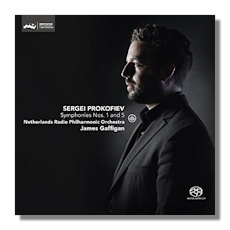
The Internet's Premier Classical Music Source
Related Links
- Prokofieff Reviews
- Latest Reviews
- More Reviews
-
By Composer
-
Collections
DVD & Blu-ray
Books
Concert Reviews
Articles/Interviews
Software
Audio
Search Amazon
Recommended Links
Site News
 SACD Review
SACD Review
Serge Prokofieff

Symphonies
- Symphony #1 "Classical", Op. 25
- Symphony #5, Op. 100
Netherlands Radio Philharmonic Orchestra/James Gaffigan
Challenge Classics SACD CC72732 58:33 Hybrid Multichannel
American Conductor James Gaffigan continues his Prokofiev symphony cycle with the composer's two most popular works in the genre, the clever and terse Classical Symphony (#1, from 1917), written during the latter stages of World War I and on the eve of the Bolshevik Revolution, and Symphony #5 (1944), composed near the end of World War II. The witty Classical Symphony exhibits nothing of war or conflict, but the epic #5 depicts struggle and ultimate triumph, the composer describing it as a work celebrating the "greatness of the human spirit." In 2016 I reviewed Gaffigan's excellent recording of the Prokofiev Sixth and Seventh symphonies here (Challenge Classics SACD CC72714). Unfortunately, I missed the first issue in this series, which came in 2015 containing the Third Symphony and the 1930 version of the Fourth.
This new SACD is obviously directed at a wider audience than the previous releases, and will likely garner greater attention for its many fine assets and because of the popularity of these works. Gaffigan delivers a somewhat leisurely account of the Classical Symphony, especially in the first movement. But detail is rich throughout, even in the minutest aspect of the playing, including application of rubato (which is always subtly used), tempo, and phrasing in general. There is nothing leisurely about the finale though, which zips along joyfully and crowns this utterly spirited and brilliantly conceived and played performance. I must say that of the several dozen recordings of this symphony that I have in my collection or have heard in concert or through broadcast, relatively few have failed to impress. Put simply, this is one of those works whose cheer, charm and wit seem to carve out an ineluctable path for the conductor and orchestra to follow.
The Fifth, however, is a bit more of a challenge: its path can be somewhat of a maze. A conductor can take a lean or epic view of the work, or can play up its ironies and sarcasm, or its tragedy and triumph, or can mix these elements in various combinations. Gaffigan mixes, turning out a centrist reading that favors grandeur and triumph, while never slighting the darker moments of the third movement Adagio, or the acid and wit of the second movement Scherzo. There's plenty of cheer and triumph in his finale too, and his first movement is noble and heroic – and quite powerful, especially in the all-conquering, percussion-laden coda. Tempos throughout are moderate and phrasing straightforward and faithful to the score. You can't find fault with anything in the first movement. Ditto for the ensuing Scherzo, a movement here that sprints crisply ahead, missing none of Prokofiev's humor or acid. The Trio is suave and unassuming at the outset (Prokofiev taking a leisurely ride through downtown Moscow in a Rolls Royce, they say), then turns happily celebratory (as the car must have stopped at an amusement park, I say). The buildup to the main theme is well handled and the frantic and colorful coda is most effective.
The third movement is full of passion and darkness, qualities usually found in most fine performances, though. But here there is also a sense of anxiety, most notably in the middle section where tempos are slightly on the brisk side and the atmosphere edgy. The Finale is quite lively and colorful, though you can barely hear the tambourine accompanying the main theme on its second appearance which is played by the strings. Why the reticence? That quibble aside, the rest of the movement is fine, with the ending a conflation of high jinks and triumph, about as well played here as in any other recording.
The sound reproduction by Challenge Classics is excellent and the Netherlands Radio Philharmonic Orchestra plays at or nearly at world class level for the conductor. It appears that Gaffigan's Prokofiev symphony cycle can effectively rival any of the other four recent cycles by Karabits (Onyx), Alsop (Naxos), Gergiev (Mariinsky), and Litton (BIS), as well as older efforts by Kitayenko (Phoenix Edition), Gergiev (Decca), Rozhdestvensky (Melodiya), Kuchar (Naxos), Ozawa (DG), Weller (Decca), Jarvi (Chandos), Kosler/Supraphon and several others. Forget Rostropovich (Erato) and Martinon (Vox), as they are inferior efforts. In the end, you can't go wrong with this new SACD by Gaffigan and the Netherlands Radio SO.
Copyright © 2018, Robert Cummings


















